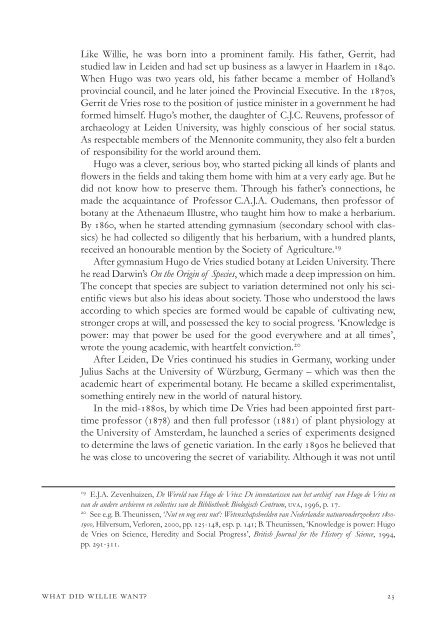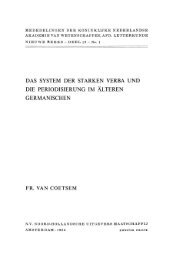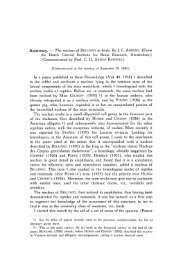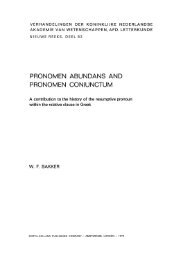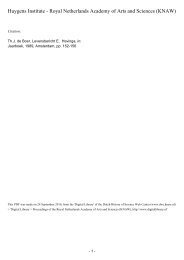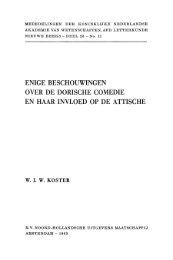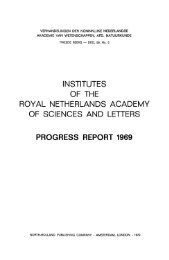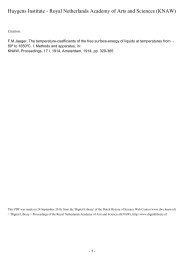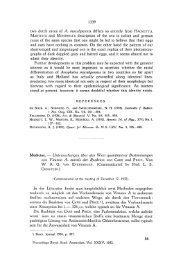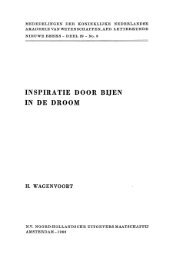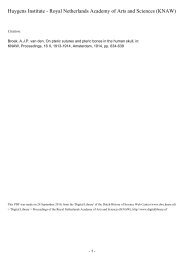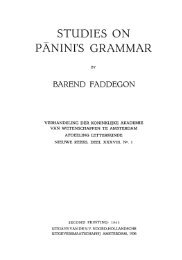PDF (full volume) - DWC - KNAW
PDF (full volume) - DWC - KNAW
PDF (full volume) - DWC - KNAW
Create successful ePaper yourself
Turn your PDF publications into a flip-book with our unique Google optimized e-Paper software.
Like Willie, he was born into a prominent family. His father, Gerrit, had<br />
studied law in Leiden and had set up business as a lawyer in Haarlem in 1840.<br />
When Hugo was two years old, his father became a member of Holland’s<br />
provincial council, and he later joined the Provincial Executive. In the 1870s,<br />
Gerrit de Vries rose to the position of justice minister in a government he had<br />
formed himself. Hugo’s mother, the daughter of C.J.C. Reuvens, professor of<br />
archaeology at Leiden University, was highly conscious of her social status.<br />
As respectable members of the Mennonite community, they also felt a burden<br />
of responsibility for the world around them.<br />
Hugo was a clever, serious boy, who started picking all kinds of plants and<br />
fl owers in the fi elds and taking them home with him at a very early age. But he<br />
did not know how to preserve them. Through his father’s connections, he<br />
made the acquaintance of Professor C.A.J.A. Oudemans, then professor of<br />
botany at the Athenaeum Illustre, who taught him how to make a herbarium.<br />
By 1860, when he started attending gymnasium (secondary school with classics)<br />
he had collected so diligently that his herbarium, with a hundred plants,<br />
received an honourable mention by the Society of Agriculture. 19<br />
After gymnasium Hugo de Vries studied botany at Leiden University. There<br />
he read Darwin’s On the Origin of Species, which made a deep impression on him.<br />
The concept that species are subject to variation determined not only his scientifi<br />
c views but also his ideas about society. Those who understood the laws<br />
according to which species are formed would be capable of cultivating new,<br />
stronger crops at will, and possessed the key to social progress. ‘Knowledge is<br />
power: may that power be used for the good everywhere and at all times’,<br />
wrote the young academic, with heartfelt conviction. 20<br />
After Leiden, De Vries continued his studies in Germany, working under<br />
Julius Sachs at the University of Würzburg, Germany – which was then the<br />
academic heart of experimental botany. He became a skilled experimentalist,<br />
something entirely new in the world of natural history.<br />
In the mid-1880s, by which time De Vries had been appointed fi rst parttime<br />
professor (1878) and then <strong>full</strong> professor (1881) of plant physiology at<br />
the University of Amsterdam, he launched a series of experiments designed<br />
to determine the laws of genetic variation. In the early 1890s he believed that<br />
he was close to uncovering the secret of variability. Although it was not until<br />
19 E.J.A. Zevenhuizen, De Wereld van Hugo de Vries: De inventarissen van het archief van Hugo de Vries en<br />
van de andere archieven en collecties van de Bibliotheek Biologisch Centrum, uva, 1996, p. 17.<br />
20 See e.g. B. Theunissen, ‘Nut en nog eens nut’: Wetenschapsbeelden van Nederlandse natuuronderzoekers 1800-<br />
1900, Hilversum, Verloren, 2000, pp. 125-148, esp. p. 141; B. Theunissen, ‘Knowledge is power: Hugo<br />
de Vries on Science, Heredity and Social Progress’, British Journal for the History of Science, 1994,<br />
pp. 291-311.<br />
what did willie want? 23


